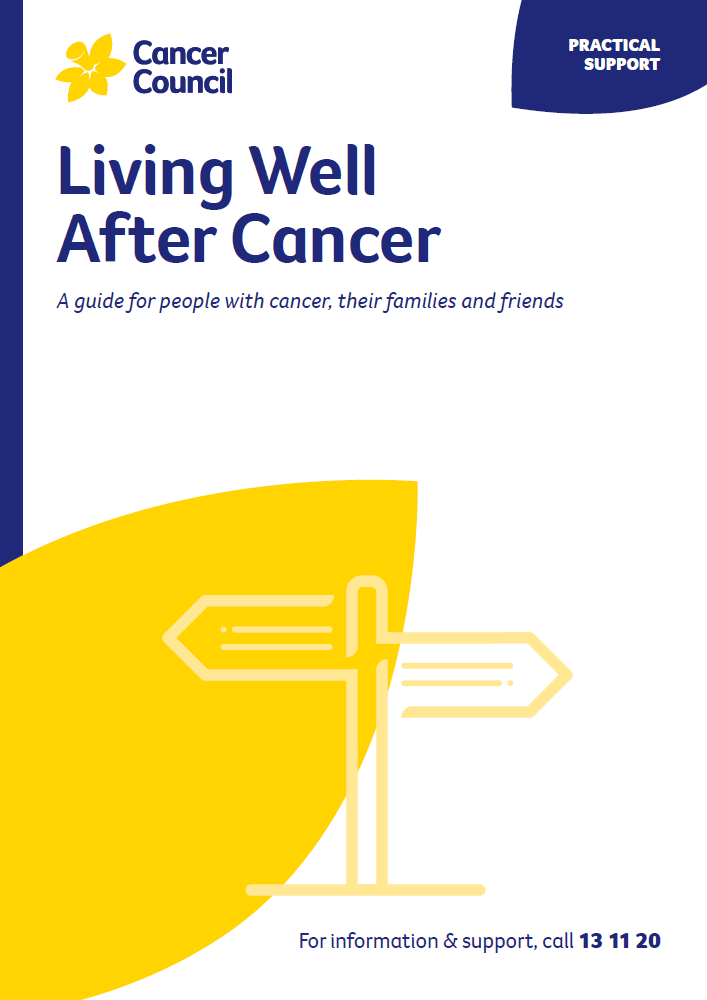- Home
- About Cancer
- Cancer treatment
- Surgery
- Life after treatment
Life after treatment
For most people, the cancer experience doesn’t end the day after surgery. Life after cancer treatment can present its own challenges. You may have mixed feelings, and worry that every ache and pain means the cancer is coming back.
Some people say that they feel pressure to return to “normal life”. It is important to allow yourself time to adjust to the physical and emotional changes, and establish a new daily routine at your own pace. Your family and friends may also need time to adjust.
Cancer Council 13 11 20 can help you connect with other people who have had surgery for cancer, and provide you with information about the emotional and practical aspects of living well after cancer.
For more on this, see Living well after cancer.
Dealing with feelings of sadness
If you have continued feelings of sadness, have trouble getting up in the morning or have lost motivation to do things that previously gave you pleasure, you may be experiencing depression. This is quite common among people who have had cancer.
Talk to your GP, because counselling or medication – even for a short time – may help. Some people can get a Medicare rebate for sessions with a psychologist. Cancer Council may also run a counselling program in your area.
For information about coping with depression and anxiety, call Beyond Blue on 1300 22 4636. For 24-hour crisis support, call Lifeline 13 11 14.
More resources
Prof Elisabeth Elder, Specialist Breast Surgeon, Westmead Breast Cancer Institute and University of Sydney, NSW; Chanelle Curnuck, Dietitian – Dietetics and Nutrition, Sir Charles Gairdner Osborne Park Health Care Group, WA; Department of Anaesthetics, Perioperative Medicine and Pain Medicine, Peter MacCallum Cancer Centre, VIC; Jessica Feeney, Nurse Unit Manager, Breast, Endocrine and Gynaecology, Royal Adelaide Hospital, SA; A/Prof Richard Gallagher, Head and Neck Surgeon, Director of Cancer Services and Head and Neck Cancer Services, St Vincent’s Health Network, NSW; John Leung, Consumer; Rohan Miegel, Senior Physiotherapist – Cancer Care, Flinders Medical Centre, SA; A/Prof Nicholas O’Rourke, University of Queensland and Head of Hepatobiliary Surgery, Royal Brisbane Hospital, QLD; Lucy Pollerd, Social Worker, Peter MacCallum Cancer Centre, VIC; Suzanne Ryan, Clinical Nurse Consultant, Department of General Surgery, Sunshine Coast University Hospital, QLD; Rebecca Yeoh, 13 11 20 Consultant, Cancer Council Queensland.
View the Cancer Council NSW editorial policy.
View all publications or call 13 11 20 for free printed copies.
Need to talk?
Support services
Cancer Connect
Talk to someone who has experienced cancer
Coping with cancer?
Speak to a qualified health professional or someone who has experienced cancer, or find a support group or forum
Cancer information
Family and friends
Learn how we can help you navigate cancer as a carer, family member or friend
Common reactions
At any stage after a cancer diagnosis, you may experience times of distress and feel a range of strong emotions, such as disbelief, fear, sadness, anxiety and anger

